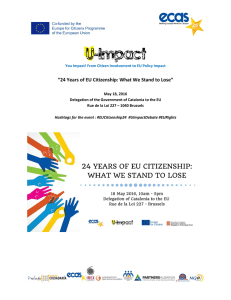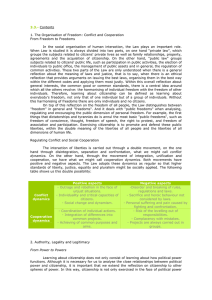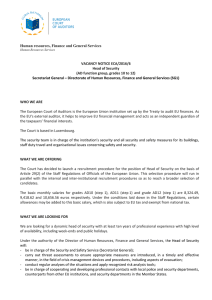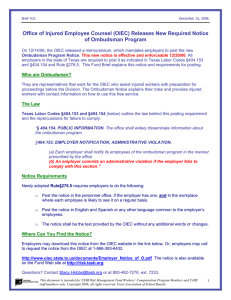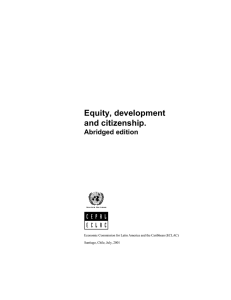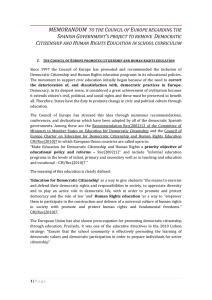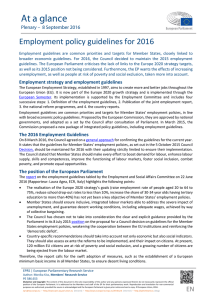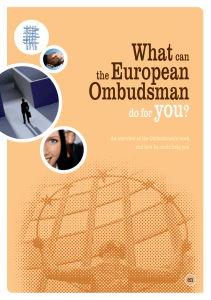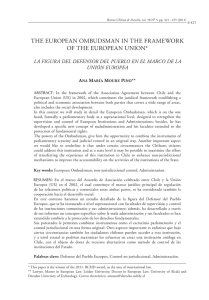24 Years of EU Citizenship: Removing the
Anuncio
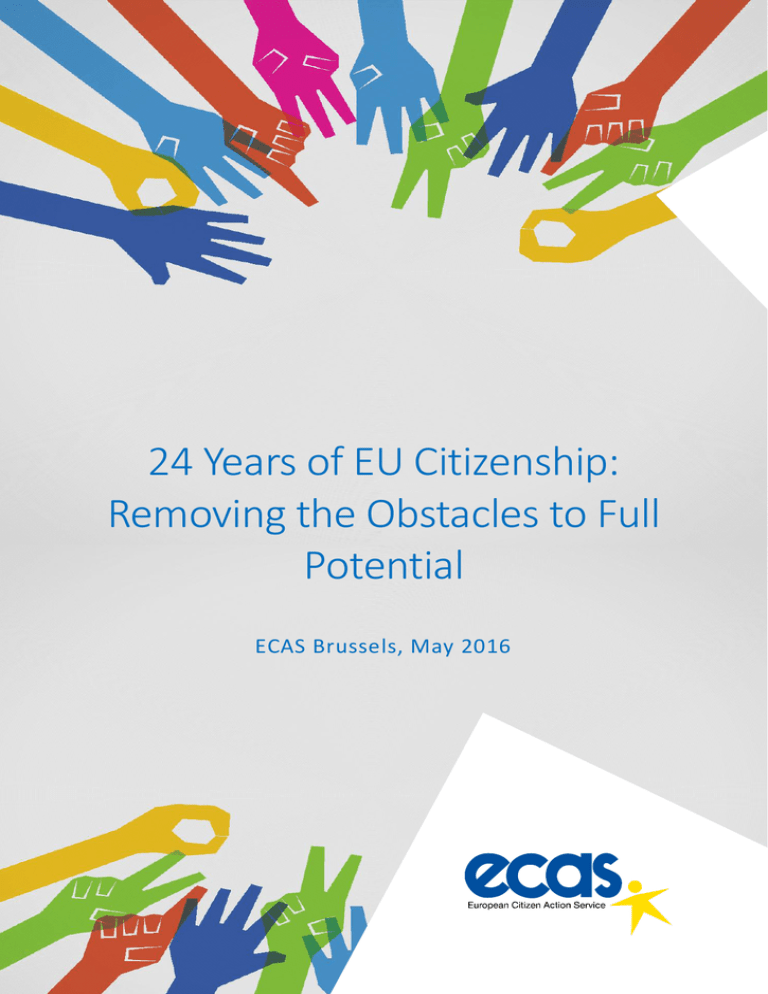
24 Years of EU Citizenship: Removing the Obstacles to Full Potential ECAS Brussels, May 2016 ‘It is remarkable that the European is defined not by race, or language, or customs, but by his aims and the amplitude of his will’ (Paul Valery) This policy brief has been developed by the European Citizen Action Service as part of the project U-Impact: From Citizen Involvement to Policy Impact. Partners of this project are non-profit organisations active in promoting citizens’ participation at European level from Albania, Belgium, Cyprus, France, Estonia, Italy, Romania, Spain and Bulgaria. Author: Marta Pont, Membership and Outreach Manager, ECAS Editor: Assya Kavrakova, Director, ECAS This document is copyright of ECAS ©ECAS 2016. All rights reserved. You may not, except with the express written permission of the author, distribute or commercially exploit the content. “This project has been funded with the support of the Europe for Citizens Programme. The European Commission support for the production of this publication does not constitute an endorsement of the contents which reflect the views only of the authors, and the Commission cannot be held responsible for any use which may be made of the information contained therein.” 24 Years of EU Citizenship: Removing Obstacles to Full Potential Page 4 of 24 CONTENTS INTRODUCTION ...................................................................................................................................................... 6 POLICY ARGUMENTATION ........................................................................................................................................ 7 The policy background .................................................................................................................................. 7 What is at stake ............................................................................................................................................. 7 Enhancing citizens’ awareness of their rights ........................................................................................... 8 Removing enforcement obstacles and deficiencies at national level ...................................................... 10 Enhancing transparency and access to documents at EU level ............................................................... 14 CONCLUSIONS AND RECOMMENDATIONS ................................................................................................................. 16 BIBLIOGRAPHY ..................................................................................................................................................... 17 Annex I: ECAS 10 Recommendations to EU Citizenship Consultation .............................................................. 19 24 Years of EU Citizenship: Removing Obstacles to Full Potential Page 5 of 24 INTRODUCTION EU Citizenship and the rights that come with it are one of the cornerstones of the European project, if not the main achievement. European citizenship, enshrined in the EU Treaties, has formed part of the EU aquis since 1992 when the Maastricht Treaty was adopted, making it an objective for the Union ‘to strengthen the protection of the rights and interests of the nationals of its Member States through the introduction of a citizenship of the Union’. The ultimate aim of EU Citizenship was to increase the citizens’ sense of identification and belonging to the European Union, and thereby to create a European identity by outlining a number of rights which citizens could enjoy in the same way as national citizenships do. Concretely, Union citizenship implies the following rights for European citizens: The right to travel and to live freely within the EU, subject to certain conditions, commonly known as ‘freedom of movement’ The right not to be discriminated on grounds of nationality The right to vote and to stand as candidates in EU and in local elections The right to be assisted by another EU country’s embassy or consulate outside the EU if their country does not have diplomatic representation there The right to petition the European Parliament, to file a complaint to the Ombudsman and to address EU institutions in any EU official language The right to access European Parliament, Council and Commission documents, subject to certain conditions The right to organise or support a citizens’-led initiative to invite the European Commission to bring forward new EU legislation, through the so-called “European Citizens’ Initiative”, the legal basis of which was recently established in the Lisbon Treaty. While all these rights are duly protected in the Treaties, important gaps still remain between the applicable legal norms and the reality that citizens face in their daily lives, particularly in cross-border situations. The pitfalls are explained by various reasons: lack of information and of awareness of citizens about the rights they are entitled to as Union citizens; Member States’ lengthy or unclear administrative procedures; EU’s own opaque decision-making processes, or lack of instruments that would facilitate the enjoyment of such rights. This paper aims to take stock of the key achievements of EU citizenship, almost 25 years after the concept was introduced, but most importantly it aims to identify the pending challenges where more work remains to be done in order to remove the obstacles standing in the way of citizens’ enjoyment of their rights. This analysis will be then used to formulate a set of policy recommendations to EU institutions, calling them to take the appropriate actions. 24 Years of EU Citizenship: Removing Obstacles to Full Potential Page 6 of 24 POLICY ARGUMENTATION The policy background After the entry into force of the Lisbon Treaty in 2009, which significantly upgraded the EU Citizenship concept, the European Commission started developing a triennial report on the status of EU Citizenship in order to monitor progress and identify remaining gaps in this area. The first Citizenship Report1, published in October 2010, identified three main areas where further work was needed in order for citizens to tap the potential of EU Citizenship: 1) Effectively enforce EU rights, paying attention in particular to the transposition of EU Directives into national law; 2) Make the exercise of individual rights simpler by eliminating unnecessary complications and in particular reducing administrative burden generated by national practices and procedures; 3) Raise citizens’ awareness about their rights. In order to address these gaps, the Commission put forward 25 concrete actions to improve the enforcement of citizens’ rights. These actions included, among others: facilitating access to cross-border health care; increasing the effectiveness of the right of EU citizens to seek diplomatic or consular assistance outside the EU; developing a common set of rights for passengers travelling across the EU; facilitating free movement of EU citizens and their third-country family members by enforcing the existing EU rules; facilitating the free circulation of civil status documents; promoting good practices and stepping up the dissemination of information about such right; developing the existing Your Europe web portal into an easyto-use, one-stop-shop information point on the rights of citizens and businesses in the EU, and strengthening citizens' awareness of their EU citizenship status, their rights and their meaning in their daily lives. The 2013 Citizenship Report2, issued in May 2013, identified 12 actions grouped in 6 broad areas - a number of which were already envisaged in the previous report - to improve EU citizens’ lives, namely: removing obstacles for workers, students and trainees in the EU; cutting red tape in EU countries; protecting the more vulnerable in the EU; eliminating barriers to shopping in the EU; supporting local administrations in providing targeted and accessible information to EU citizens about their rights and who to turn to in case of nonrespect, and enhancing citizens’ electoral rights and their full participation in the democratic life of the EU. What is at stake Obstacles remain in the very awareness, as well as in the implementation of rights of EU citizens. despite the follow-up initiatives undertaken by the EU institutions to address these shortcoming and mainly by the European Commission as sole initiator of the legislative procedure. 1 2 European Commission (2010), EU Citizenship Report 2010: Dismantling the obstacles to EU citizens’ rights (COM(2010) 603 final). European Commission (2013), EU Citizenship Report 2013: Your rights, your future, (COM(2013) 269 final). 24 Years of EU Citizenship: Removing Obstacles to Full Potential Page 7 of 24 In times of crisis, where eurosceptical and europhobic forces are on the rise, there is a dire need to regain citizens’ trust in the European project and to counter the prevailing fatigue. The rights attributed to EU citizens in the Treaties are quite substantial and unique, and some of them are particularly cherished by Europeans. Making sure that they can be properly enjoyed will put the achievements of the project in the spotlight again and will help fight current populist narratives. Failure to do so will only trigger more euroscepticism and distrust in Europe, and ultimately question the very foundations of the Union. *** The analysis which follows is structured in three parts. The first part discusses the citizens’ awareness of their rights as EU citizens. This is the first element to be looked at before moving to the actual implementation of these rights, as there cannot be a full enjoyment of rights without public awareness of their existence. The second one looks at the deficiencies in the practical implementation of some of these rights at national level. The paper particularly focuses on the rights to free movement, to petition the EU institutions and to participate in the EU democratic system, given the author’s expertise in these fields. Finally, the third part analyses the transparency of EU decision-making process and its implications for the exercise of some EU rights and for the credibility of EU institutions as a whole. Enhancing citizens’ awareness of their rights Only 4 in 10 Europeans are well-informed about their rights The findings of the 2016 Flash Eurobarometer on EU Citizenship 3 show that progress has been made since the last survey was carried out in 2012 as almost all Europeans are now familiar with the concept of “EU Citizenship”. However, only a little over half of them understand what being an EU citizen actually means. In addition, the figures are less positive when it comes to awareness of the rights that come with EU Citizenship and the mechanisms in place to enforce them. Across the EU, just over 4 in 10 respondents say they feel informed about their rights as citizens of the European Union, and close to 6 in 10 feel that they are either not very well informed or not at all informed. When it comes to information about the existing tools for enforcement, less than 3 in 10 Europeans know what to do if their rights as EU citizen are not respected, which shows that there is still significant room for improvement in the context of providing citizens with information. This is why one of ECAS’ key recommendations to the Commission’s last EU Citizenship consultation is to encourage Member States to take a more proactive approach with regard to the provision of information to citizens and to the provision of training to national administrations on EU citizens’ rights (see annex I). Free movement and right to petition EU institutions most popular rights The Eurobarometer also shows that over 8 in 10 Europeans are aware of the right to reside in another EU Member States and to make a complaint to the European Commission and petition the European Ombudsman and the European Parliament. There is also relatively high awareness about the right to equal 33 European Commission (2016), Flash Eurobarometer 430 report on European Union Citizenship. 24 Years of EU Citizenship: Removing Obstacles to Full Potential Page 8 of 24 treatment when residing in another EU Member State (close to 8 in 10 respondents). Around 7 in 10 Europeans are aware that when outside the EU they have the right to seek help from the embassy of any other EU country if their country does not have one there. A bit less than 7 in 10 are aware that they can participate in a European Citizens’ Initiative. These encouraging results about the general public’s awareness of the ECI, however, stand in sharp contast to what ECI organisers and NGOs generally report about the ECI. According to an analysis on the implementation of the ECI published by the European Parliament’s Research Service (EPRS) in February 20154, ECI organisers are being confronted with a lack of knowledge about this instrument among citizens, but also among media professionals, which explains why they consistently call on EU institutions and the media to better promote the ECI as a tool for participatory democracy of citizens. Not surprisingly one of the key recommendations of the European Parliament’s analysis is to set up a one-stopshop for support and information to ECI organisers. This is as far as rights-awareness goes. When it comes to the implementation side, there are important shortcomings, as shown by the last public consultation on EU Citizenship5, carried out from September to December 2015 by the Directorate-General for Justice and Consumers, in which ECAS also participated. Close to 4 in 10 respondents out of those who had either lived or were living in another EU country for at least 3 months said they had experienced difficulties in exercising their rights as EU citizens after having moved, and they pointed to lengthy or unclear administrative procedures and to a lack of sufficient information as main hurdles. More information needed to increase EU citizens’ democratic participation With regard to electoral rights, a majority of Europeans in the last Flash Eurobarometer on Electoral Rights 6 believe that more information would be key in increasing voter turnout in European elections. In particular, over 8 in 10 respondents point out the need for more information on the programmes, objectives, candidates and parties in the European Parliament, as well as on the impact of EU policies on the daily lives of citizens. Better information about the candidates running for the presidency of the European Commission is also positively scored by a majority of respondents. Additionally, in 13 Member States a majority of respondents think that transnational lists could attract more voters in European elections. The key recommendations of ECAS in its contribution to the EU Citizenship Consultation (see Annex I) include strengthening the European dimension of EU elections through European transnational lists allowing parties to fight for European mandates, improving and developing further the Spitzenkandidaten practice and encouraging cross-border broadcasting as a mean to provide citizens with objective information about the EU. 4 European Parliamentary Research Service (2015), Implementation of the European Citizens Initiative: The experience of the first three years, pp. 10-11. 5 European Commission (2016), Public Consultation on EU Citizenship 2015 Factsheet. 6 European Commission (2016), Flash Eurobarometer 431 on Electoral Rights. 24 Years of EU Citizenship: Removing Obstacles to Full Potential Page 9 of 24 Removing enforcement obstacles and deficiencies at national level Social security and access to healthcare, key issues for mobile EU citizens When it comes to the nature of the problems experienced by EU citizens, ECAS’ expertise in the area of free movement rights gained through its service contract with the European Commission “Your Europe Advice” provides substantial insights. The data collected through this service was used by ECAS to provide evidence-based recommendations to the Commission’s EU Citizenship consultation on the most common obstacles faced by mobile EU citizens (see concrete recommendations in annex I). Social security issues remain the top area of concern for EU citizens who exercise their free movement rights, as almost 30% of the enquiries that the Your Europe Advice legal experts handle yearly touch exclusively upon this area, representing about 6,000 enquiries per year. Within social security enquiries, access to healthcare is a particular source of concern for mobile EU citizens. About 2,300 enquiries of sickness benefits are being handled every year by Your Europe Advice legal experts. They mainly concern the so-called ‘citizens in limbo’, that is, EU citizens who after exercising their free movement rights find themselves uncovered because they no longer meet the social security conditions from their home member state, while at the same time they are being excluded from the public healthcare system of the host member state, based on exclusionary restrictions introduced by member states as caveats to the application of Directive 2004/38/EC7. Your Europe Advice enquiries 25000 20000 15000 10000 5000 0 2011 Total enquiries 2012 Social Security 2013 2014 Entry procedures 2015 Residence rights Source: Your Europe Advice statistics 7 European Union (2004), Directive No 2004/38/EC of 29 April 2004 on the right of citizens of the Union and their family members to move and reside freely within the territory of the Member States, Official Journal of the European Union, L 158/77. 24 Years of EU Citizenship: Removing Obstacles to Full Potential Page 10 of 24 Another problem relates to the exportability of long-term care benefits, for instance of pensions and disability or sickness benefits, which is not foreseen in the EU Regulation 883/2004 on the Coordination of Social Security Systems8 currently in force. The 3-month limited timeframe for the portability of unemployment benefits is also an issue of concern for EU citizens who decide to move to another member state, as such a provision no longer reflects the present labour market situation after the economic crisis, where finding another job takes usually more than only 3 months. In addition, the Your Europe Advice team receives more and more enquiries about entry procedures, which account for about 20% of the total enquiries. These questions tend to be based on family reunification issues, as provided for in the Directive 2004/38/EC9, which extends the rights recognized to EU citizens to their family members, whether EU-country nationals or third-country nationals. Finally, the third top issue of concern for mobile EU citizens relates to residence rights, which accounts for about 18% of the total enquiries received. Easier registration to the electoral roll and additional options for casting a vote On the electoral rights side, over 2 in 10 respondents to the EU Citizenship consultation10 said they experienced difficulties in trying to vote in EU or local elections whilst living in another EU country and pointed to insufficient information on how to register on the electoral roll and on how to vote as major pitfalls. This finding is also supported by the majority of respondents to the Flash Eurobarometer on Electoral Rights11, who think that a simplified procedure for registering to the electoral roll and the ability to cast the vote electronically or by post would make voting in the country of residence easier for non-national EU citizens. The view that e-voting could facilitate the exercise of the right to vote in EU elections is also maintained by ECAS, and was included in our recommendations to the Commission’s Citizenship consultation (see annex I). Making the ECI an instrument for participatory democracy fit for purpose Regardless how high or low the general public’s awareness of the ECI might be, a number of deficiencies in the practical implementation of this instrument appear obvious in all related impact assessment studies and analyses. These studies have also been endorsed by an overwhelming majority of MEPs in the European 8 European Union (2004), Regulation No 883/2004 on the Coordination of Social Security Systems of 29 April 2004, Official Journal of the European Union, L166/1. 9 European Union (2004), Directive No 2004/38/EC of 29 April 2004, op. cit. 10 European Commission (2016), Public Consultation on EU Citizenship 2015 Factsheet, op.cit. 11 European Commission (2016), Flash Eurobarometer 431 on Electoral Rights, op.cit. 24 Years of EU Citizenship: Removing Obstacles to Full Potential Page 11 of 24 Parliament’s ECI Resolution12, adopted on 28 October 2015. The steady decline in the number of ECIs submitted since this tool became available in April 2012 only comes to confirm the existence of flaws in the system. The main demand is a need for a thorough revision of the ECI Regulation13 concerning primarily the following areas: (i) the procedure of the follow-up to a successful ECI, (ii) the legal status of the citizens’ committee and its liability for processing personal data, (iii) the removal of the automatic link between the registration of an ECI and the start of the period for collecting signatures and (iv) the simplification of the online collection of signatures. Such are the main recommendations made by the European Parliament to the European Commission in order to improve the functioning of the ECI. Indeed, the perceived lack of impact of the ECIs, which makes citizens more frustrated, is identified as one of the biggest weaknesses of this instrument in the SWOT analysis of a recent study commissioned by the European Parliament to ECAS14. A majority of the 21 experts who participated in this study agree that the ECI is not a cost-effective tool, considering the great efforts required to organise one and the low certainty of impact, as well as the fact that even if an ECI is successful, the results are non-binding to the European Commission in terms of agenda-setting. Another important group of weaknesses identified by the experts relates to the excessive and discouraging requirements for identification and personal data, and the unnecessarily inflexible and hindering time period for the collection of signatures. ECI SWOT ANALYSIS: TOP 10 WEAKNESSES (where > 5 = high priority) 1. The ECI leaves citizens more frustrated due to its lack of impact (6.19) 2. Requirements for identification and personal data are excessive (6.19) 3. The ECI is unknown to citizens (6) 4. The ECI is not user-friendly (5.9) 5. Rules regarding the (start of the) time period for ECI support collection are inflexible and hinder the process unnecessarily. (5.9) 6. The ECI is not cost-effective, considering the great efforts required to organise it and the low certainty of a meaningful impact (5.8) 7. ECI coordination is unnecessarily complex due to lack of harmonised rules for identification requirements (5.8) 8. ECI organisers are unable to provide clear feedback to supporting citizens, as the OCS does not provide this facility (5.33) 9. The ECI excludes expats, who cannot sign an ECI in their country of residence (5.14) 10. The results of the ECI are non-binding (5.14) Source: Elisa Lironi, ECAS (201615) 12 European Parliament (2015), Resolution of 28 October 2015 on the European Citizens’ Initiative (2014/2257(INI)). 13 European Union (2011), Regulation No 211/2011, of 16 February 2011 on the citizens’ initiative, Official Journal of the European union, L 65/1. 14 Elisa Lironi, ECAS (2016), The Potential and Challenges of e-Participation in the European Union, study commissioned by the European Parliament’s Policy Department C: Citizens’ Rights and Constitutional Affairs. 15 Ibid., pp. 44-51 and 64. 24 Years of EU Citizenship: Removing Obstacles to Full Potential Page 12 of 24 The low public awareness about the ECI is also ranked high by the experts as an important weakness of this instrument, which again challenges the rather optimistic findings of the Flash Eurobarometer on EU Citizenship16. Another area of concern it the so-called ‘legal admissibility test’, which relates to the conditions set out in Art. 4(2) of the ECI Regulation that must be satisfied before a proposed initiative is registered by the European Commmission. According to the findings of an analysis17 undertaken in 2014 by ECAS with the assistance of Freshfields Bruckhaus Deringer LL, the practice of applying the Regulation by the Commission suggests that in a number of cases: the legal admissibility test was too narrowly applied (e.g. because the proposed initiative correctly identified a legal basis in the Treaties, and the subject matter of the initiative fell within the scope of the EU’s competence); the decision to refuse registration was arbitrary (e.g. because initiatives with similar characteristics were treated differently); and/or the reasons given for rejection were incomplete (e.g. because the Commission did not fully address all the Treaty provisions cited as a legal basis). The difficulties experienced by ECI organisers at the very registration phase due to the complexity of the legal admissibility test and its narrow application by the European Commission are confirmed by Lawyer Onno Brouwer from Freshfields Bruckhaus Deringer. Commenting on a recent Judgment18 by the European Court of Justice on the refusal of registration of the ECI ‘Right to Lifelong Care’, Brouwer claims that: ‘[…]The Judgment illustrates the flaws of the ECI Regulation. It is primarily the ECI Regulation that has set a threshold for the registration of the ECI that is too high and requires in-depth knowledge of EU law in order for a request for registration to be successful. Only carefully drafted requests for registration that identify in detail the legal bases in the Treaty are likely to be registered. This explains why many of the ECIs have been denied registration.’ Indeed, one of our key recommendations to the Commission with regard to the ECI concerns the need to clarify the legal admissibility test in order to make the system more accessible and to avoid further frustration of EU citizens. 16 European Commission (2016), Flash Eurobarometer 430 report on European Union Citizenship, op.cit. 17 ECAS (2014), The European Citizens’ Initiative registration: Falling at the first hurdle? – Analysis of the registration requirements and the “subject matters” of the rejected ECIs, p.4. 18 European Court of Justice (2016), Judgment of the General Court of 19 April 2016 in Case T-44/14. 24 Years of EU Citizenship: Removing Obstacles to Full Potential Page 13 of 24 While the ECI remains an important tool for participatory democracy and should be improved to enhance its use by citizens, ECAS proposes in its recommendations to the Commission to go beyond the ECI and the usual consultation schemes to initiate a model for crowdsourcing legislation at EU level. This would enable citizens to engage more regularly and openly with policy-makers on a particular topic. Enhancing transparency and access to documents at EU level EU citizens have the right to access any document of the EU institutions, in line with article 1 of Regulation 1049/200119 regarding public access to European Parliament, Council and Commission documents. As provided for in article 4 paragraph 1 of this Regulation, Institutions may only refuse access to certain documents to the public where disclosure would undermine the protection of: the public interest as regards public security; defense and military matters; international relations; and the financial, economic or monetary policy of the Union or its Member States the privacy and the integrity of an individual. Access to EU public documents is therefore a right of EU citizens, which is also enshrined in article 42 of the EU Charter of Fundamental Rights20, and exceptions to it should be interpreted narrowly, as stated by the European Ombudsman. Yet complaints relating to lack of transparency within the EU institutions continue to top the list of complaints to the European Ombudsman, accounting for 20% to 30% of the total number of complaints received annually. The most common transparency issue concerns the institutions’ refusal to grant access to documents and/or information21. Promoting an open and inclusive decision-making process is part of ECAS’ core mission. In line with this goal the organisation has filed several complaints to the European Ombudsman requesting its interference in the disclosure of specific documents of public interest, to which the European Commission refused access in the past. For instance, ECAS requested that the European Commission grant public access to background documents related to the UK opt-out from the EU Charter of Fundamental Rights. This was a major issue in the intergovernmental negotiations leading to the adoption of the Treaty of Lisbon. The Commission refused to grant access to these documents, invoking one of the exceptions provided for in article 4 of the Regulation. Following ECAS’ complaint the European Ombudsman initiated an inquiry against the Commission at the end of which it was concluded that the Commission’s arguments for the refusal were not convincing. After the Ombudsman strongly criticized the Commission for serious maladministration, the 19 European Union (2001), Regulation No 1049/2001 of 30 May 2001 regarding public access to European Parliament, Council and Commission documents, Official Journal of the European Union, L 145/43. 20 European Union (2012), Charter of Fundamental Rights of the European Union, Official Journal of the European Union, C 326/391. 21 European Ombudsman (2015), Annual Report 2014. 24 Years of EU Citizenship: Removing Obstacles to Full Potential Page 14 of 24 Commission released all the requested documents22. However, transparency concerns are not limited to the access of public documents. Complaints to the European Ombudsman also concern the meetings that take place behind closed doors among the EU institutions to speed up the decision-making process, i.e. the so-called ‘trilogues’. Whilst article 15 of the Treaty on the Functioning of the European Union (TFEU)23 provides that ‘EU institutions conduct their work as openly as possible in order to promote good governance and ensure the participation of civil society,’ and that the two co-legislators meet in public when considering and voting on a draft legislative act, they increasingly rely on secretive trilogues for swift agreement. While the ordinary legislative procedure (codecision) can entail up to three readings, around 80% of EU law is now agreed upon at first reading because of the use of trilogues. This undermines the transparency principle and the opportunities of civil society to be involved in and consulted throughout the legislative process. In view of this negative trend, the European Ombudsman opened an investigation in May 201524 related to the transparency of trilogues. With this inquiry, the Ombudsman had two main aims: first, the disclosure of the documents relating to the trilogues; and second, the transparentcy of these meetings in general. The EU institutions have been rather reluctant to cooperate. The Council addressed a letter25 to the Ombudsman in September 2015 explaining that it is the prerogative of the EU co-legislators to choose how to organise their political dialogues through a legislative procedure. In such cases, the Council reminded her, these decisions fall outside of the Ombudsman’s mandate. Recently, the European Ombudsman launched a public consultation26 gathering the input of the public and civil society on how to make these meetings more transparent. The consultation closed at the end of March 2016 and the results should be available in the coming months. 22 European Ombudsman (2014), Decision of 4 November 2014 in the inquiry into complaint 216/2009/(TN)(DK)TN against the European Commission. 23 European Union (2012), Treaty on the Functioning of the European Union, TFEU (consolidated version), Official Journal of the European Union, C 326/47. 24 European Ombudsman (2015), Ombudsman opens an investigation to promote transparency of “trilogues”, Press release No 9/2015. 25 Council of the European Union (2015), Response to the letter the European Ombudsman on Own-initiative inquiry OI/8/2015/FOR concerning transparency of trilogues, 11873/15. 26 European Ombudsman (2016), European Ombudsman public consultation on the transparency of trilogues, case OI/8/2015/JAS. 24 Years of EU Citizenship: Removing Obstacles to Full Potential Page 15 of 24 CONCLUSIONS AND RECOMMENDATIONS This analysis shows that while there was some improvement in public awareness of rights granted to EU citizens (particularly the rights of free movement and to petition EU institutions), important work still remains be done regarding other rights, such as the ECI. There are also important shortcomings in terms of implementation. These are due to a lack of sufficient information on how to exercise certain rights, to complex and/or unclear administrative procedures at the national and EU levels, and to harmonisation gaps in crucial areas at the EU level such as the social security systems coordination. Finally, both transparency and good governance at EU level require progress as they both have direct impact on the credibility and legitimacy of EU institutions as a whole. ECAS and its partners under the U-Impact project will use this analysis, the findings of the third EU Citizenship report, the conclusions of the Ombudsman’s consultation, as well as the outcome of the discussions at the U-Impact final conference in Brussels “24 Years of Citizenship: What We Stand to Lose” to elaborate on key recommendations to EU policy-makers. 24 Years of EU Citizenship: Removing Obstacles to Full Potential Page 16 of 24 BIBLIOGRAPHY Council of the European Union (2015), Response to the letter the European Ombudsman on Own-initiative inquiry OI/8/2015/FOR concerning transparency of trilogues, 11873/15. [online] Available at: http://www.statewatch.org/news/2015/sep/eu-council-ombusdman-trilogues-letter-11873-15.pdf ECAS (2014), The European Citizens’ Initiative registration: Falling at the first hurdle? – Analysis of the registration requirements and the “subject matters” of the rejected ECIs. [online] Available at: http://www.ecas.org/wp-content/uploads/2014/12/ECI-report_ECAS-2014_1.pdf Elisa Lironi, ECAS (2016), The Potential and Challenges of e-Participation in the European Union, study commissioned by the European Parliament’s Policy Department C: Citizens’ Rights and Constitutional Affairs, pp. 44-51 and 64. European Commission (2010), EU Citizenship Report 2010: Dismantling the obstacles to EU citizens’ rights (COM(2010) 603 final). [online] Available at: http://ec.europa.eu/justice/citizen/files/com_2010_603_en.pdf European Commission (2013), EU Citizenship Report 2013: Your rights, your future, (COM(2013) 269 final). [online] Available at: http://ec.europa.eu/justice/citizen/files/com_2013_269_en.pdf European Commission (2016), Flash Eurobarometer 430 report on European Union Citizenship. [online] Available at: http://ec.europa.eu/justice/citizen/document/files/2016-flash-eurobarometer-430citizenship_en.pdf European Commission (2016), Flash Eurobarometer 431 on Electoral Rights. [online] Available at: http://ec.europa.eu/justice/citizen/document/files/2016-summary-flash-eurobarometer-431-electoralrights_en.pdf European Commission (2016), Public Consultation on EU Citizenship 2015 Factsheet. European Court of Justice (2016), Judgment of the General Court of 19 April 2016 in Case T-44/14. [online] Available at: http://curia.europa.eu/juris/document/document.jsf?text=&docid=176441&pageIndex=0&doclang=EN&mo de=lst&dir=&occ=first&part=1&cid=702716 European Ombudsman (2014), Decision of 4 November 2014 in the inquiry into complaint 216/2009/(TN)(DK)TN against the European Commission. [online] Available at: http://www.ombudsman.europa.eu/cases/decision.faces/en/58275/html.bookmark European Ombudsman (2015), Annual Report 2014. [online] Available http://www.ombudsman.europa.eu/en/activities/annualreport.faces/en/59959/html.bookmark at: European Ombudsman (2015), Ombudsman opens an investigation to promote transparency of “trilogues”, Press release No 9/2015. [online] Available at: http://www.ombudsman.europa.eu/en/press/release.faces/en/59975/html.bookmark. 24 Years of EU Citizenship: Removing Obstacles to Full Potential Page 17 of 24 European Ombudsman (2016), European Ombudsman public consultation on the transparency of trilogues, Case OI/8/2015/JAS. [online] Available at: http://www.ombudsman.europa.eu/cases/correspondence.faces/en/61589/html.bookmark European Parliament (2015), Resolution of 28 October 2015 on the European Citizens’ Initiative (2014/2257(INI)). [online] Available at: http://www.europarl.europa.eu/sides/getDoc.do?pubRef=//EP//TEXT+TA+P8-TA-2015-0382+0+DOC+XML+V0//EN European Parliamentary Research Service (2015), Implementation of the European Citizens Initiative: The experience of the first three years. [online] Available at: http://www.europarl.europa.eu/EPRS/EPRS_IDAN_536343_Implementation_of_the_European_Citizens_Initi ative.pdf European Union (2001), Regulation No 1049/2001 of 30 May 2001 regarding public access to European Parliament, Council and Commission documents, Official Journal of the European Union, L 145/43. [online] Available at: http://eur-lex.europa.eu/legal-content/EN/TXT/PDF/?uri=CELEX:32001R1049&from=EN European Union (2004), Directive No 2004/38/EC of 29 April 2004 on the right of citizens of the Union and their family members to move and reside freely within the territory of the Member States, Official Journal of the European Union, L 158/77. [online] Available at: http://eurlex.europa.eu/LexUriServ/LexUriServ.do?uri=OJ:L:2004:158:0077:0123:en:PDF European Union (2004), Regulation No 883/2004 on the Coordination of Social Security Systems of 29 April 2004, Official Journal of the European Union, L166/1. [online] Available at: http://eurlex.europa.eu/LexUriServ/LexUriServ.do?uri=OJ:L:2004:166:0001:0123:en:PDF European Union (2011), Regulation No 211/2011, of 16 February 2011 on the citizens’ initiative, Official Journal of the European union, L 65/1. [online] Available at: http://eurlex.europa.eu/LexUriServ/LexUriServ.do?uri=OJ:L:2011:065:0001:0022:EN:PDF European Union (2012), Charter of Fundamental Rights of the European Union, Official Journal of the European Union, C 326/391. [online] Available at: http://eur-lex.europa.eu/legalcontent/EN/TXT/?uri=CELEX:12012P/TXT European Union (2012), Treaty on the Functioning of the European Union, TFEU (consolidated version), Official Journal of the European Union, C 326/47. [online] Available at: http://eur-lex.europa.eu/legalcontent/EN/TXT/PDF/?uri=CELEX:12012E/TXT&from=EN 24 Years of EU Citizenship: Removing Obstacles to Full Potential Page 18 of 24 ANNEX I: ECAS 10 RECOMMENDATIONS TO EU CITIZENSHIP CONSULTATION On citizens' right to move freely in the EU • Encourage Member States to take a more proactive approach to raising awareness about first-hand information on EU law at national level and in the provision of training to national administrations on EU citizens’ rights • Unify simplified and accessible procedures and documents for obtaining residenceas much as possible across Member States •Increase the period of the exportability of unemployment benefits under the Coordination of Social Security Systems Regulation to at least 6 months On citizens' democratic participation in the EU • Strengthen the European dimension of EU elections through European transnational lists, allowing parties to fight for European mandates • Developing further the "Spitzenkandidaten” practice by giving citizens the opportunity to identify and pre-select the lead candidates running for the Commission Presidency • Introduce e-voting to facilitate the exercise of the right to vote in EU elections, ensuring the system’s reliability and compliance with data protection standards • Encourage cross-border broadcasting as means to provide objective information to EU citizens on the actual situation of the EU • Adopt a tailor-made approach to engaging youth by identifying where young people naturally are in the digital space and going to them through e-participation • Improve the European Citizens’ Initiative by clarifying the legal admissibility test and by simplifying the online process of collecting signatures in order to make it much more accessible to EU citizens • Initiate a crowdsourcing experience at EU level to enable citizens to express their ideas and interact with policy-makers more openly on a regular basis 24 Years of EU Citizenship: Removing Obstacles to Full Potential Page 19 of 24 European Citizen Action Service 77, Avenue de la Toison d'Or B-1060 Brussels, Belgium +32 (0) 2 548 04 90 +32 (0) 2 548 04 99 [email protected] www.ecas.org
